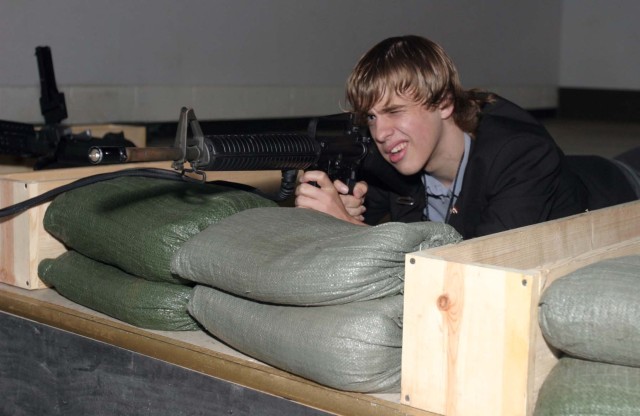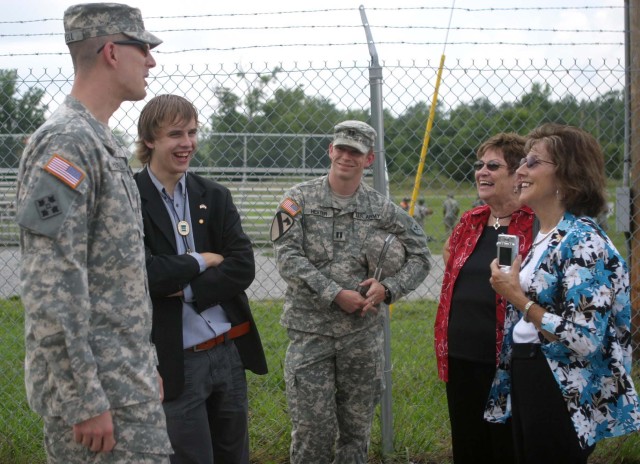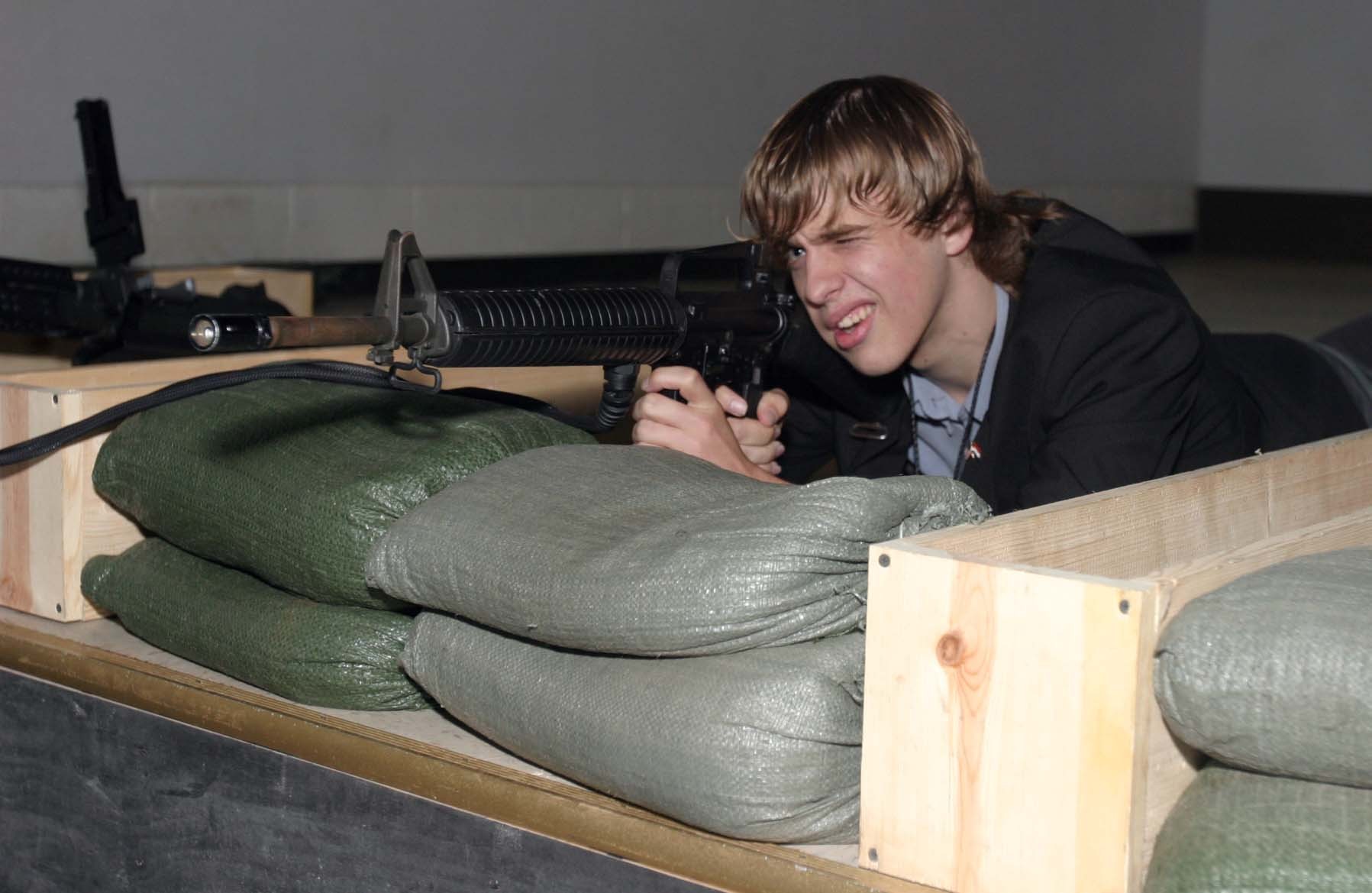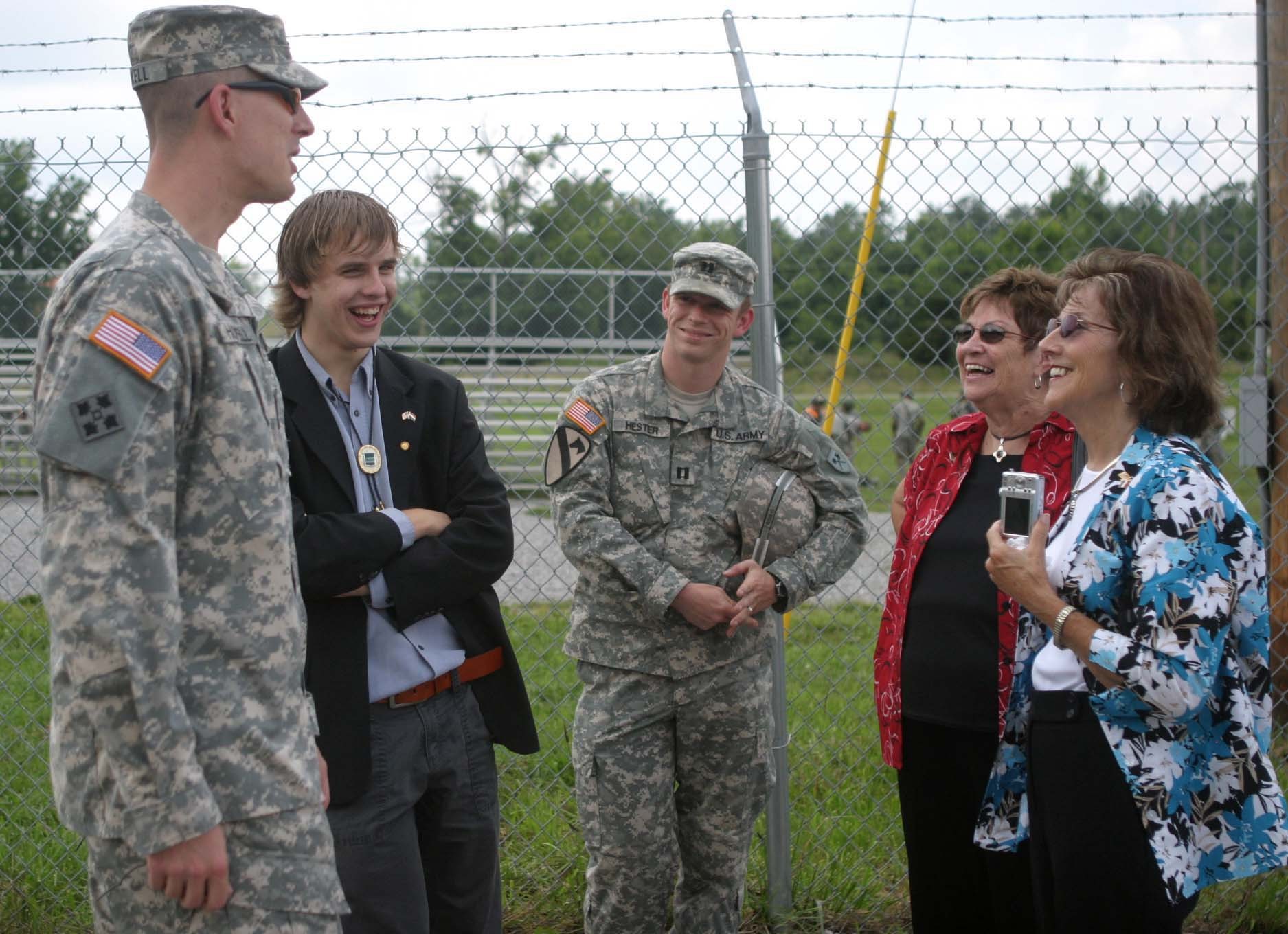Sebastiaan Vonk was not connected in any way to Pvt. Charles Brinkley, a World War II Soldier who fought with the 80th Infantry Division and was killed in 1945 during the liberation of Hosingen, Luxembourg.
Yet Vonk, of the Netherlands, adopted Brinkley's grave at the Henri-Chapelle American cemetery in Belgium more than two years ago. He visits the grave site about five times a year, places flowers on it, and then takes photos and sends them to Brinkley's two daughters and stepson.
Vonk was recognized for his efforts in a Fort Knox ceremony July 23. Representatives from the 80th Infantry Association, 80th Training Command, and Brinkley's family members were on hand at the Patton Museum to extend their appreciation to him for his efforts and his dedication to American Soldiers.
Vonk became certified with the Adopt a Grave program when he was 13 years old and has adopted the graves of three American Soldiers - one in the Netherlands and two in Belgium at separate cemeteries.
Mike Conley, a spokesman for the American Battlefield Monument Commission in Arlington, Va., a federal agency that maintains American cemeteries in foreign countries, said the Adopt a Grave program is about showing respect.
"They treat that individual as a family member, periodically visit the grave, and bring flowers and place them at the gravesite," he said. "They learn as much as they can about the individual."
Vonk learned about the program while doing research on World War II.
"I've been interested in the Second World War for years, and I went online and read about the Adopt a Grave program," Vonk said. "I thought it was a respectful way to thank the Soldiers for what they did. It's maybe the only thing you can do for them."
At 16, he doesn't meet the Netherland's minimum age requirement of 18 to obtain a driver's license, so he must find other ways to make the three-hour drive to reach Brinkley's grave and the other two graves he adopted. Either his father drives him or he takes a train, he said. He uses his own money to fund the trips and to buy flowers for the graves.
Faye McManus, who lives in South Carolina, is one of Brinkley's daughters. She was 8 months old at the time of her father's death. She said Vonk was an extraordinary person.
"He's doing this for his own intrinsic reward," she said. "We love him and we feel so fortunate he's part of our family. We feel extremely fortunate that he adopted Daddy's grave."
Elizabeth Holland, McManus' sister who lives in Maryland, was 4 years old when her father was killed. She believes her father was buried overseas to spare family members additional trauma.
"I think when he was first killed they weren't bringing them back rapidly, and after a certain period of time had passed, my mother and my dad's parents decided to just leave it as was," she said. "I think they thought it would be more traumatic at that point to go through it again. Some time had lapsed before they even knew of his death."
During World War II, at the end of battles, service members were buried in thousands of temporary burial sites, Conley said.
"Families were given the option of having the remains removed from the temporary cemeteries and sent home or relocated to one of the permanent (overseas) sites," he said. "Approximately 35 to 40 percent were interred overseas in World War II."
Conley said there were many reasons why service members were buried overseas.
"In some cases, service members actually in letters said, 'If I'm lost, I'd like to be buried with my comrades,'" he said. "Some families thought it would be good to have them buried in the land they helped liberate.
"It has been U.S. policy to bring war dead home beginning with Korea," Conley said.
Russell Sick, who also fought with the 80th Infantry Division in World War II, said he is pleased someone is taking care of the graves.
"It's commendable when another generation comes along and appreciates our sacrifice," he said.
Elmer Dorsten, also an 80th Infantry Division World War II veteran, agreed Vonk was doing a wonderful thing.
"I would like to see more young people taking care of the graves," he said.
Vonk doesn't plan to end visitation to his adopted grave sites any time soon.
"Some people have adopted graves after (the) war, but they are getting older and they pass it on to their families or turn it back over to the organization," he said. "I'll go as long as I'm able to."
There are almost 125,000 World War I and World War II U.S. service members buried overseas in 24 cemeteries maintained by the ABMC, Conley said. The interments of remains at the cemeteries are permanent.
The ABMC also maintains a cemetery in Mexico City, where service members are interred from the Mexican-American War, and a cemetery in Panama that includes 6,000 service members and civilians, many of whom died of yellow fever while building the Panama Canal.
In addition to the cemeteries, the ABMC maintains 25 monuments and memorials in 15 countries.
Conley said the American overseas cemeteries are renowned for their beauty and the high standards for which they are meticulously maintained.
"One of the reasons our facilities look the way they do is the dedication of our foreign national workers," he said. "The citizens of those countries have not forgotten what America did for their freedom in two world wars. You see that same respect reflected in those employees who take care of the cemeteries."
When Holland first visited her father's grave, she said she didn't think she would become so overwhelmed.
"It (wasn't) just my dad whom I (was) crying for and so emotional for," she said, "but also for hundreds and hundreds of 18 and 19 year olds. They were children. (There were) hundreds and hundreds of crosses. At the time I had a teenage son. It was mindboggling."
Dr. Jerry Leonard, who was born after Charles Brinkley's widow married his father, said Vonk is the Web master for a Web site created on behalf of a European association that now adopts the graves of American heroes. Vonk designed the site himself, Leonard said.
"His tireless work on behalf of our honored dead is an inspiration to not only the youth of his native Netherlands, but also to the youth of the United States and other countries as well," Leonard said. "He asks nothing for himself, but seeks only to honor our brave Soldiers who gave their lives in liberating both the Netherlands and Europe from the horrors of the Nazi regime."
Leonard said Vonk was a shining example of why American Soldiers fought and died in World War II and why they continue to fight in foreign lands.
"I know that both my father and stepfather, both of whom fought during World War II in Europe, would, if they were still among the living, greatly appreciate the actions of this young Dutch lad who cares so deeply about our fallen Soldiers," Leonard said.
Vonk will return to the Netherlands with many memories of Kentucky. The Leonard family, who lives in Guston, Ky., hosted Vonk during his two-week stay and treated him to visits of Mammoth Cave, the state capitol, Daniel Boone's gravesite, the Frazier Museum, and Churchill Downs, among other places.
According to Leonard, Vonk is only the second person under the age of 18 to be commissioned a Kentucky Colonel by the governor.
"He also got to go to the VA hospital in Louisville to see some of the effects of the war," Leonard said. "He got to see first-hand the effects of all the wars; World War II, Korea, Vietnam, and both Gulf wars. It was enlightening to him."
The Netherlands doesn't have VA hospitals, Leonard added.
Vonk will return home and work three weeks for his father, who is responsible for directing the management of dikes and ensuring the water supply stays clean. He will then take a week of holiday prior to returning to school, he said.
The Brinkley and Leonard families said they hope Vonk can return soon for another visit.
"Truly, God has blessed the United States of America with such a wonderful young friend," Leonard said.




Social Sharing